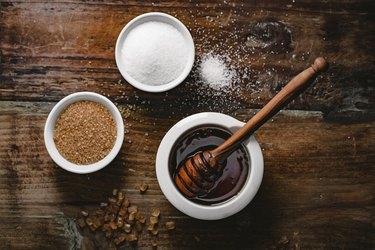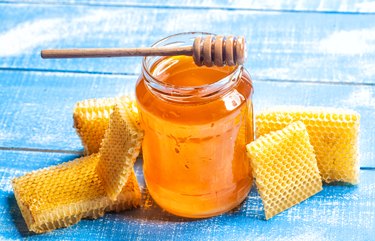
When it comes to sweetening your coffee, tea or favorite recipes, sugar and honey are two popular choices — but how do they really compare? Are they nutritional twins, or does one have an edge over the other? And most importantly, does honey "count" as sugar?
The answers might surprise you. While both sugar and honey are packed with sweetness and calories, their composition, how your body processes them and even their health effects can differ in some interesting ways.
Video of the Day
Video of the Day
Ahead, registered dietitian Amanda Holtzer, RD, breaks it all down so you can decide which one deserves a spot in your pantry.
What's the Difference Between Sugar and Honey?
Sugar and honey may both be sweet, calorie-dense sources of simple carbohydrates, but there are some key differences between the two, according to Holtzer and the University of Arizona:
- Composition: Table sugar is sucrose, a combination of glucose and fructose chemically bound together. In honey, glucose and fructose remain separate, along with up to 25 different oligosaccharides (complex carbohydrates).
- Calories: One tablespoon of sugar contains about 49 calories, while honey clocks in at 68 calories per tablespoon.
- Digestion: Sugar requires enzymes in the small intestine and liver to break down sucrose into glucose for absorption. In contrast, honey is "pre-digested" by bees by adding enzymes that split sucrose into glucose and fructose, making it easier for your body to absorb.
- Glycemic index (GI): Sugar has a GI of 65, meaning it spikes blood sugar levels faster, while honey's GI of 58 results in a more moderate increase.
Is Honey Healthier Than Sugar?
While honey and sugar share similarities, honey offers a few extra health perks that sugar doesn't:
1. Anti-inflammatory Properties
Honey contains flavonoids and polyphenols — antioxidants that can help reduce inflammation in the body, Holtzer says. These compounds may also help neutralize harmful free radicals, protecting your body from oxidative damage, Holtzer adds.
2. Antibacterial Effects
With a pH between 3.2 and 4.5, honey can inhibit bacterial growth, Holtzer says. Manuka honey, in particular, is packed with a compound called methylglyoxal, giving it strong antibacterial properties, she says. In fact, it's often used for wound healing.
3. Medicinal Uses
Honey has been used as a natural remedy for thousands of years. It's applied topically for wounds and burns and taken orally to soothe coughs or fight infections like strep throat or tonsillitis, Holtzer says.
4. Trace Nutrients
Honey isn't just sugar and water — it also contains small amounts of vitamins and minerals like vitamin C, niacin, calcium, magnesium and zinc, Holtzer says.
Health Concerns of Sugar and Honey
While honey has some sweet perks, it shares many of sugar's potential downsides — especially when eaten in excess. Here's a breakdown:
1. Weight Gain
Both sugar and honey are calorie-dense. Overdoing either can add up quickly, leading to unwanted weight gain, Holtzer says.
2. Blood Sugar Issues
Eating sugar, including in the form of honey, prompts your pancreas to release insulin, which helps move sugar from your bloodstream into your cells for energy, Holtzer says. But when you overdo it regularly, your body can develop insulin resistance, where insulin stops working effectively. This leaves sugar in your blood, causing elevated blood sugar levels and, over time, increasing your risk of type 2 diabetes, she says.
3. Heart Disease
A diet high in sugar can hurt your heart health. Case in point: Excessive sugar intake can cause your liver to produce more LDL ("bad") cholesterol, Holtzer says.
High LDL levels can raise your risk of heart disease and stroke. Plus, too much sugar contributes to high blood pressure and chronic inflammation — both major pathways to heart disease, per Harvard Health Publishing.
4. Oral Health Problems
Sugar can feed the bacteria in plaque, leading to tooth decay, cavities and gum disease like gingivitis, Holtzer says.
5. Infant Botulism
Honey is a no-go for babies under 1 year old. It can contain spores of Clostridium botulinum, a bacterium that infants' immature digestive systems can't handle, according to the University of Arizona. These spores can cause infant botulism, a rare but serious illness with symptoms like constipation, weak crying and muscle weakness. If your baby shows these signs, seek medical help immediately.
So, Does Honey 'Count' as Sugar?
Yes, honey counts as sugar — and it's even more concentrated, Holtzer says. One teaspoon of honey contains 6 grams of sugar, compared to 4 grams in a teaspoon of cane sugar. While honey has some health benefits, it's important to limit it just like you would any other added sugar. Overdoing it can still lead to the same health risks as excess sugar.
So how much sugar is OK? The American Heart Association says to aim for no more than 25 to 36 grams of added sugar per day.
The bottom line: Enjoy honey's benefits — but keep your intake in check.


